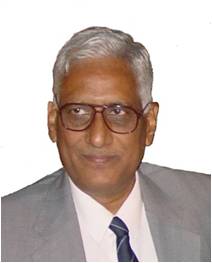Multi-Disciplinary International Workshop on Artificial Intelligence
(MIWAI-2011) |
Tutorial Schedule
|
| Venue: |
C. V. Raman Auditorium, Science Complex, University of Hyderabad |
| Date: |
7th December 2011 |
| 9 A.M to 10 A.M: |
Registration |
| Tutorial-1 |
| 10:00 A.M to 11:30 A.M: |
Introduction to Neural Networks (Part-A)
Speaker: Prof. B. Yegnanarayana |
| 11:30 A.M to 11:45 A.M: |
Tea Break |
| 11:45 A.M to 1:15 P.M: |
Tutorial-1 (Part-B) |
|
| Dr. B. Yegnanarayana (Speaker for the Tutorial) |
 |
Dr. B. Yegnanarayana
Professor and Microsoft Chair
Speech and Vision Laboratory
IIIT Hyderabad,
Hyderabad 50032
Email: yegna@iiit.ac.in
http://speech.iiit.ac.in/~yegna |
Dr. Bayya Yegnanarayana is a professor and Microsoft Chair at the International Institute of Information Technology (IIIT) Hyderabad. Prior to joining IIIT, he was a professor at IIT Madras (1980 to 2006), a visiting associate professor at CMU, Pittsburgh, USA (1977 to 1980), and a member of the faculty at IISc, Bangalore, (1966 to 1978). He received BSc from Andhra University in 1961, and BE, ME and PhD from IISc Bangalore in 1964, 1966, and 1974, respectively. His research interests are in signal processing, speech, image processing and neural networks. He has published over 350 papers in these areas. He is also the author of the book "Artificial Neural Networks", published by Prentice-Hall of India in 1999. He has supervised 29 PhD and 36 MS theses. He is a Fellow of the Indian National Academy of Engineering, a Fellow of the Indian National Science Academy, and a Fellow of the Indian Academy of Sciences. He was the recipient of the 3rd IETE Prof. S. V. C. Aiya Memorial Award in 1996. He received the Prof. S. N. Mitra memorial Award for the year 2006 from the Indian National Academy of Engineering.
Tutorial Topic: Introduction to Neural Networks
Abstract:
This tutorial reviews the basics of artificial neural networks (ANN) for pattern recognition tasks, and presents a few applications involving optimization and prediction in some real world problems. The features of three basic ANN architectures in dealing with uncertainties in pattern recognition problems in practice will be discussed. In particular, the characteristics of feedback networks that led to the architecture of Boltzmann Machine will be discussed in detail. |
Tutorial-2 |
| 2:00 A.M to 3:30 P.M: |
Knowledge-Based Information Retrieval (Part-A)
Speaker: Prof. M. N. Murty |
| 3:30 P.M to 3:45 P.M: |
Tea Break |
| 3:45 P.M to 5:15 P.M: |
Tutorial-2 (Part-B) |
|
| Dr. M. N. Murty (Speaker for the Tutorial) |
 |
Dept. of CSA, IISc
Bangalore-560 012, India
Phone: 91-80-2293-2779
Fax: (614) 292-2911
Email: mnm@csa.iisc.ernet.in |
|
Professor M. Narasimha Murty is currently the Chairman of the Department of Computer Science and Automation at the Indian Institute of Science, Bangalore. His research interests include pattern recognition and data mining. He obtained his PhD in 1982 for his work on divide-and-conquer clustering, under the supervision of Prof. G. Krishna. He has guided 18 PhDs out of which 10 are in the area of pattern clustering. He has published more than 130 papers. He was elected Fellow of Indian National Academy of Engineering, 2009. Worked as a consultant with Satyam Computers, Novell, AOL and undertaken sponsored projects with MHRD, DST (Indo-US project), and AOARD (Tokyo). Received the Alumni Award for Excellence in Research for Engineering from the Indian Institute of Science, Bangalore, India in March 2007. He obtained BE, ME, and PhD degrees all from the Indian Institute of Science, Bangalore.
Tutorial Topic: Knowledge-Based Information Retrieval
Abstract:
In this tutorial, it is proposed to introduce the boolean model and the vector space model. The associated data structures and algorithms used in retrieval will be highlighted. One of the important tools is compression that could potentially reduce the size of the index significantly. Some popular schemes for compressing the index will be discussed. Knowledge in the form of Zipf's law and wikipedia concepts and categories is used in several IR tasks. In this tutorial knowledge-based clustering task will be examined in detail. Issues associated with dimensionality reduction, ranking and evaluation of search results will also be highlighted. |
|
|


